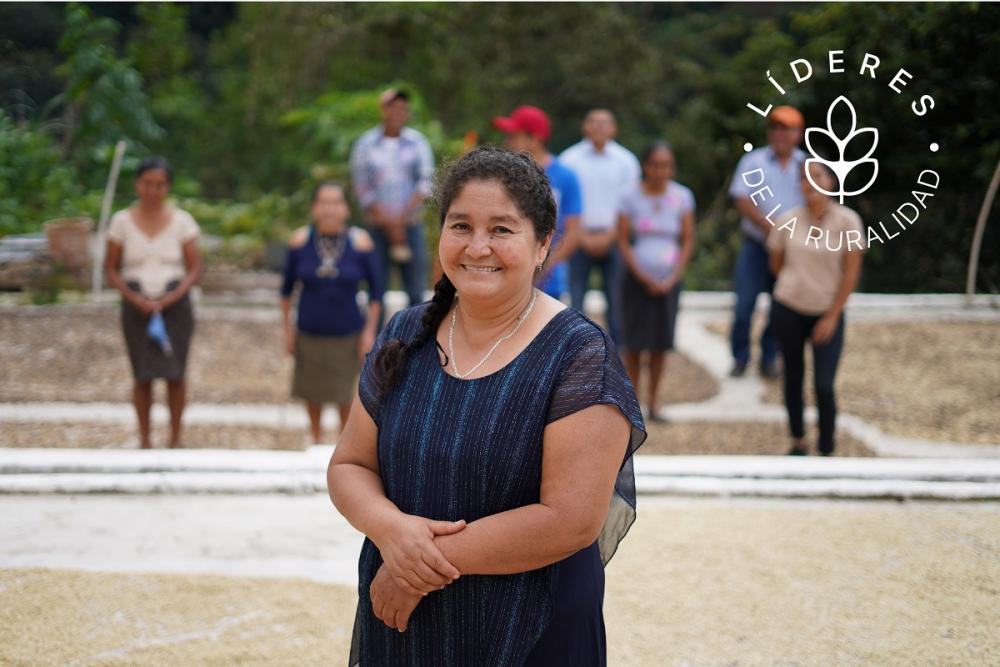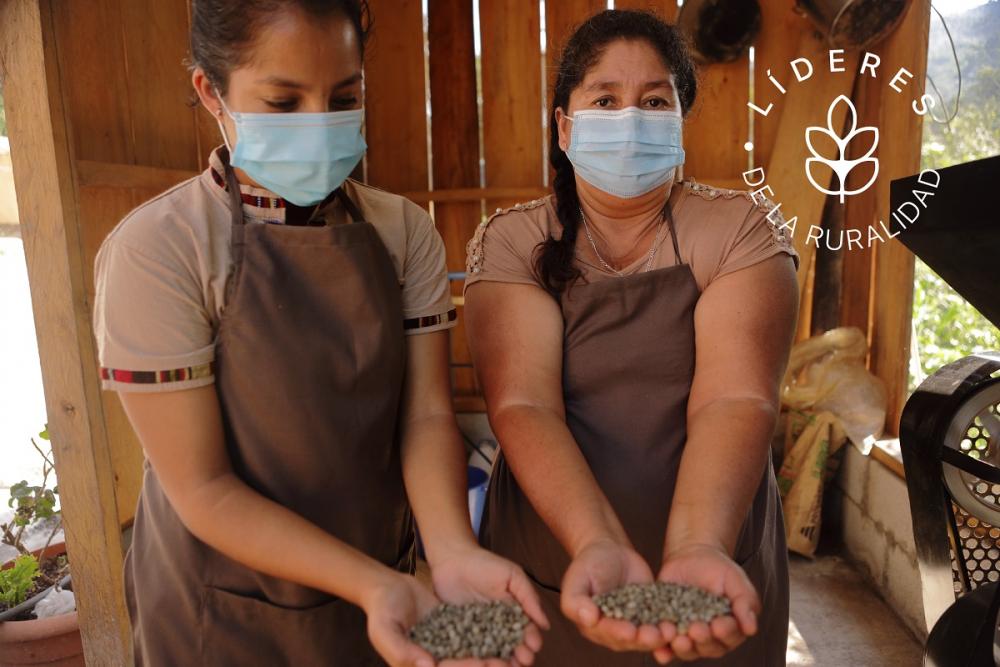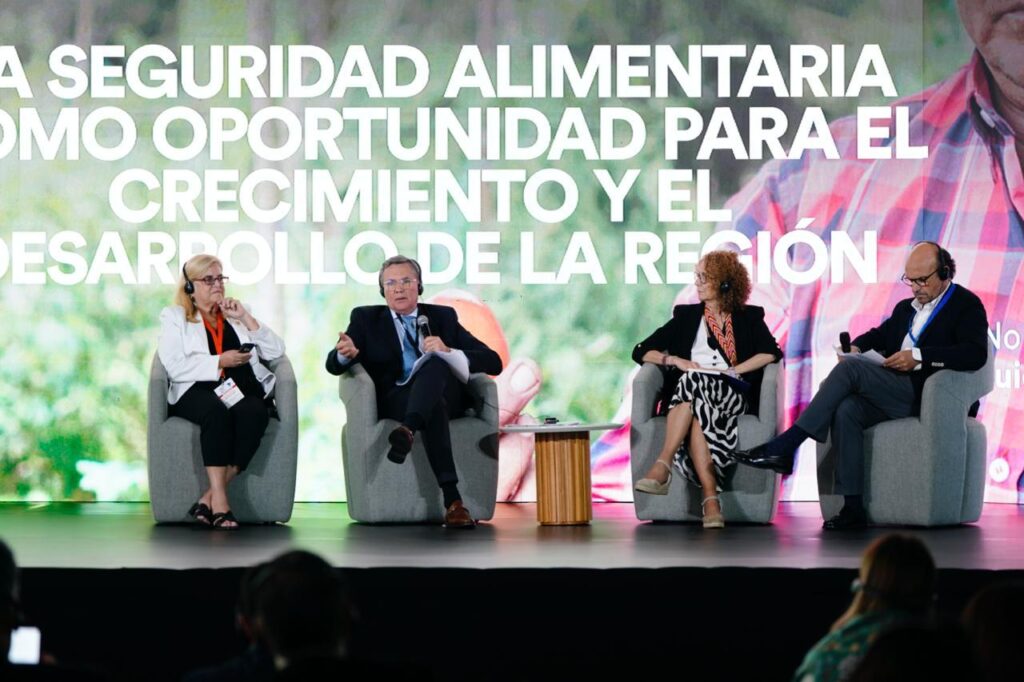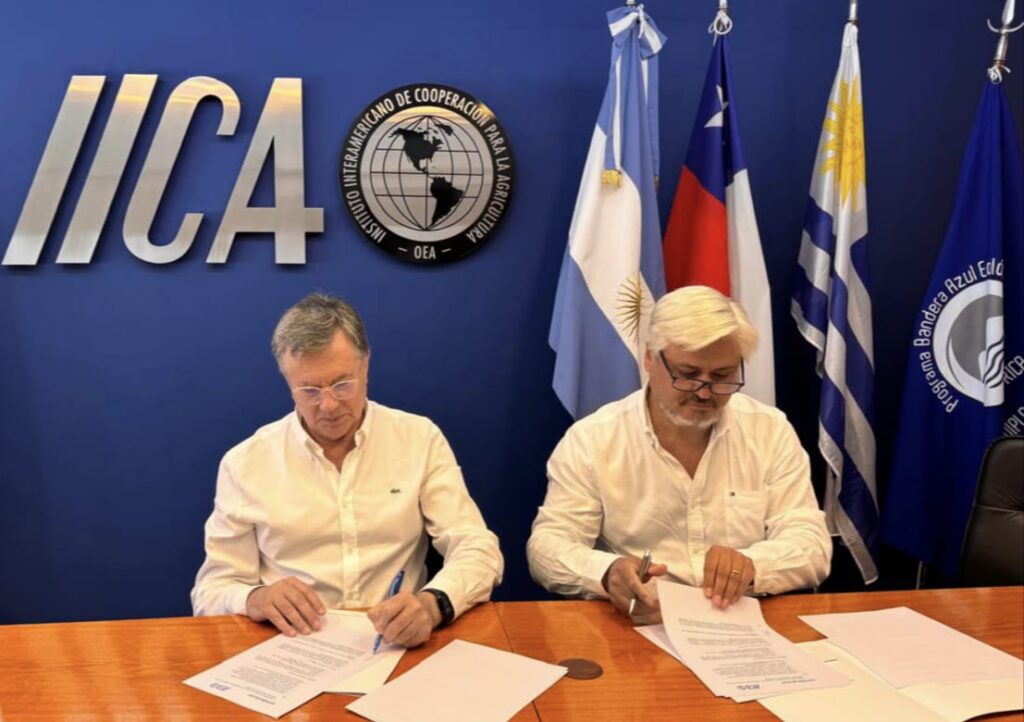El premio es parte de una iniciativa del organismo especializado en desarrollo agropecuario y rural para reconocer a hombres y mujeres que dejan huella y hacen la diferencia en el campo de América Latina y el Caribe.

San José, 31 de mayo de 2021 (IICA). La productora de café Elvia Monzón, presidenta de la Asociación Integral de Caficultores Rancho Viejo (AIDEC), de Guatemala, recibirá el premio “El Alma de la Ruralidad”, que el Instituto Interamericano de Cooperación para la Agricultura (IICA) otorga a destacados Líderes de la Ruralidad de las Américas.
El premio es parte de una iniciativa del organismo especializado en desarrollo agropecuario y rural para reconocer a hombres y mujeres que dejan huella y hacen la diferencia en el campo de América Latina y el Caribe.
Además de recibir como reconocimiento el premio “El Alma de la Ruralidad”, los Líderes de la Ruralidad premiados por el IICA serán invitados a participar de diversas instancias asesoras del organismo especializado en desarrollo agropecuario y rural.
“Se trata de un reconocimiento para quienes cumplen un doble papel irremplazable: ser garantes de la seguridad alimentaria y nutricional y al mismo tiempo guardianes de la biodiversidad del planeta a través de la producción en cualquier circunstancia. El reconocimiento, además, tiene la función de destacar la capacidad de impulsar ejemplos positivos para las zonas rurales de la región”, dijo el Director General del IICA, Manuel Otero.
En el marco de la iniciativa, el IICA trabajará para que el reconocimiento facilite vinculaciones con organismos oficiales, de la sociedad civil y del sector privado para la obtención de apoyo para sus causas.
“Hablamos de personas cuya impronta está presente en cada alimento que consumimos -adonde sea que éstos lleguen-, en cada parcela de tierra productiva y en las comunidades que habitan los agricultores y sus familias. Son hombres y mujeres que dejan huella y son el alma de la ruralidad porque producen, plantan, cosechan, crean, innovan, enseñan y unen”, consideró el Director General del IICA, Manuel Otero, al lanzar la iniciativa.
“Son personas que encarnan liderazgos silenciosos que es preciso visibilizar y reconocer. Son, por sobre todas las cosas, ejemplos de vida. Porque transforman, superan adversidades e inspiran”, agregó.
El IICA trabaja junto a sus 34 Representaciones en las Américas para la selección de los primeros #Líderesdelaruralidad.
Los resultados de la primera etapa de la iniciativa serán presentados ante el Comité Ejecutivo del IICA, una de las instancias de gobierno del Instituto.
Elvia Monzón: un liderazgo fundamental para impulsar la presencia femenina en la caficultura de Guatemala
En su cumpleaños número 50, Elvia Monzón recibió un regalo que nunca olvidará: la tostadora con la que tanto había soñado para la Cooperativa Integral de Pequeños Productores de Rancho Viejo, organización que dirige en San Antonio Huista, Guatemala.
“Fue una coincidencia inolvidable”, aseguró la caficultora. “El 19 de febrero, día de mi cumpleaños, el PROCAGICA nos sorprendió con el tostador. Miraba aquello tan bonito y no sabía cómo lo íbamos a manejar”, contó.
Pero para Elvia, una líder natural, ese fue un problema menor. La tostadora llegó poco antes de que estallara la pandemia de Covid-19, por lo que la cuarentena demoró la capacitación en su uso. “Aprendimos por nuestra cuenta, observando a los tostadores en la primera visita, y el café nos salió excelente”.
La tostadora de café es parte del plan de fortalecimiento a organizaciones de productores que promueve el PROCAGICA (Programa Centroamericano de Gestión Integral de la Roya del Café) para mejorar su integración en la cadena de café. Con ello, la organización podrá generar valor agregado y comercializar el producto a un mejor precio.
Elvia creció en San Antonio Huista, y desde la infancia se adiestró en el cultivo del café.
“Mi papá tenía café sembrado, y desde que yo tenía 7 años me llevaba a recoger. En ese entonces no venía gente de otros lugares, uno mismo y su familia trabajaba en la cosecha”, rememoró. “Cuando tenía 17 años, me dio un terreno de 5 cuerdas, yo misma hice mi semillero y mi almácigo, desde entonces”.
En su juventud, todavía soltera, con ayuda de sus hermanos sacaba hasta 15 quintales del terreno. Se casó a los 20 años y su vida transcurrió con normalidad hasta el año 2001, cuando su esposo emigró a Estados Unidos y quedó a cargo en soledad de cuatro hijos menores, de 12, 10, 5 y 3 años.
Elvia, sin embargo, no perdió sus ansias de progresar.

“Mis hijos me impulsaron a seguir adelante; yo quería trabajar fuertemente por mi familia. Como cultivaba el café necesitaba capacitarme para poder mejorar la producción, por eso me acerqué a un grupo de amistades y me incorporé a la asociación AIDEC”, la Asociación Integral de Caficultores Rancho Viejo.
En 2013, ella era la única mujer del grupo, integrado además por 15 hombres.
“No fue fácil para mí pues los hombres preguntaban qué para qué me capacitaba, si yo sola no podía hacer el trabajo, pero yo siempre me defendía, diciendo que podía compartir los conocimientos con otras personas”, afirmó.
“Cuando ingresé empecé a aconsejar a las demás señoras para que tuvieran derecho a recibir respaldo de las diferentes instituciones, y se involucraron otras dos al segundo año después de que entré”, agregó.
Ese papel de liderazgo ha resonado en la Asociación Nacional del Café, Anacafé, de Guatemala.
“Ella ha motivado a más mujeres”, dijo Magdali Martínez, especialista en desarrollo integral de la entidad.
“Doña Elvia tiene influencia y los hombres líderes de la comunidad reconocen su liderazgo y la respetan. Al principio había cierta resistencia, sin embargo, ahora la reconocen y su propia organización la pone al frente de todos los proyectos”, contó.
La participación de la mujer en las organizaciones productivas es clave, aseguró María Febres, Representante de IICA en Guatemala. “Han demostrado liderazgo, perseverancia y sobre todo trasmiten confianza a sus socios gracias a los resultados alcanzados. Para ellas el camino no es fácil, deben trabajar mucho y demostrar que realmente pueden contribuir a lograr cambios, rompiendo de esta manera estereotipos y con ello alcanzar cargos dirigenciales de mucha responsabilidad”, opinó.
Cuando en el 2015 pasó a dirigir AIDEC, Elvia ya había logrado sumar a más de 10 mujeres. En 2017, la organización se transformó en cooperativa, y ella en su presidenta. Actualmente la organización tiene 56 miembros, de ellos 15 mujeres.
“Hemos estado comercializando unos 1500 quintales de café pergamino, y con ayuda de ACODIHUE (Asociación de Cooperación al Desarrollo Integral de Huehuetenango) se logró hallar mercado. Hemos tenido acompañamiento de Anacafé y del IICA a través del PROCAGICA y se ha logrado renovar la mayor parte de los cafetales, nos han apoyado con fertilizantes, con abonos orgánicos y fungicidas”, informó.
Ahora vive con dos de sus hijos y una niña que adoptó. En su terreno tiene 20 colmenas, que le han reportado hasta 6 quintales de miel, también cría conejos y, como parte de la diversificación de cultivos en su cafetal, siembra árboles de aguacates y ha vendido alrededor de 1800 de sus frutos. “Nunca nos falta la comida”, relató.
La pandemia ha frenado un poco los planes de crecimiento de la cooperativa y el uso de la tostadora. Con la paralización del transporte público se ha detenido el procesamiento de café de aldeas cercanas, ya que la mayoría de los productores locales acarrea el café en microbús.
Una vez que pase la pandemia, Elvia espera hacer realidad otro sueño: que la cooperativa adquiera un edificio para almacenar el café.
“Actualmente muchos socios venden parte de su producción a intermediarios porque no tenemos dónde acopiar el café. Queremos comprar un predio para hacer una bodega, no me he de morir antes de ver en Rancho Viejo un lugar donde podamos acopiar el café y un mercado que nos pague un precio digno”, declaró.
PROCAGICA es un programa ejecutado por el Instituto Interamericano de Cooperación para la Agricultura (IICA) con la Unión Europea y busca mejorar las condiciones de vida de la población rural en las zonas productoras de café de Centroamérica y República Dominicana.
Visite la Galería: Líderes de la Ruralidad – Elvia Monzón, Guatemala
Más información:
Gerencia de Comunicación Institucional del IICA.
comunicacion.institucional@iica.int










